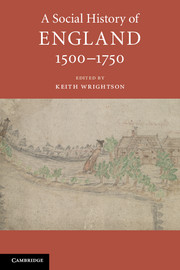Book contents
- Frontmatter
- Contents
- List of Figures
- List of Tables
- List of Contributors
- Acknowledgements
- List of Abbreviations
- Introduction: Framing Early Modern England
- PART I DISCOVERING THE ENGLISH
- PART II CURRENTS OF CHANGE
- PART III SOCIAL IDENTITIES
- 12 ‘Gentlemen’: Remaking the English Ruling Class
- 13 The ‘Middling Sort’: An Emergent Cultural Identity
- 14 The ‘Meaner Sort’: Labouring People and the Poor
- 15 Gender, the Body and Sexuality
- 16 The English and ‘Others’ in England and Beyond
- Coda: History, Time and Social Memory
- Further Reading
- Index
15 - Gender, the Body and Sexuality
from PART III - SOCIAL IDENTITIES
Published online by Cambridge University Press: 28 May 2018
- Frontmatter
- Contents
- List of Figures
- List of Tables
- List of Contributors
- Acknowledgements
- List of Abbreviations
- Introduction: Framing Early Modern England
- PART I DISCOVERING THE ENGLISH
- PART II CURRENTS OF CHANGE
- PART III SOCIAL IDENTITIES
- 12 ‘Gentlemen’: Remaking the English Ruling Class
- 13 The ‘Middling Sort’: An Emergent Cultural Identity
- 14 The ‘Meaner Sort’: Labouring People and the Poor
- 15 Gender, the Body and Sexuality
- 16 The English and ‘Others’ in England and Beyond
- Coda: History, Time and Social Memory
- Further Reading
- Index
Summary
Gender constituted a fulcrum of difference in early modern English society, structuring identity and agency in myriad ways. The pervasive significance of gender as a category of identity did not, however, create a stable set of meanings associated with either masculinity or femininity. Gender difference, as understood by early modern people, was highly fluid, fluctuating in conjunction with other variants such as age, social status and marital status. It was also subject to change over time. According to some historians, concepts of gender difference, as well as categories of sexuality and attitudes towards sex, were fundamentally redrawn towards the end of the early modern period. One unchanging dimension, however, was the extent to which understandings of gender, the body and sexuality served patriarchal interests – through privileging men and masculinity – albeit not without multiple caveats and contradictions.
The gendered body and sexuality have only relatively recently become subjects of historical investigation. Of primary importance in stimulating exploration of these themes were, on the one hand, second-wave feminism (and its commitment to historicise patriarchy) and, on the other hand, the publication of the first volume of Michel Foucault's History of Sexuality in 1976, which argued that the very concept of sexuality is a construct of modern western scientific discourse. Challenging essentialist assumptions that sex, gender and sexuality are biologically produced, feminist and cultural historians have instead approached gender difference, sexual behaviour and related categories of identity as culturally created, in service to relations of power, and therefore subject to significant variation among societies and over time. More recently, scholars have begun to express caution against attributing categories of gendered identity entirely to cultural production, on the grounds that such an approach risks neglecting the agency of the body in shaping the experience and conceptualisation of gender difference and sexual desire. Despite varied opinion as to the extent and nature of change over the course of the early modern period, as well as a more fundamental divergence over the somatic significance of the body, perhaps the most striking finding of research in this area is the central importance of concepts of sex and gender to the mental furniture of early modern people.
- Type
- Chapter
- Information
- A Social History of England, 1500–1750 , pp. 330 - 351Publisher: Cambridge University PressPrint publication year: 2017



